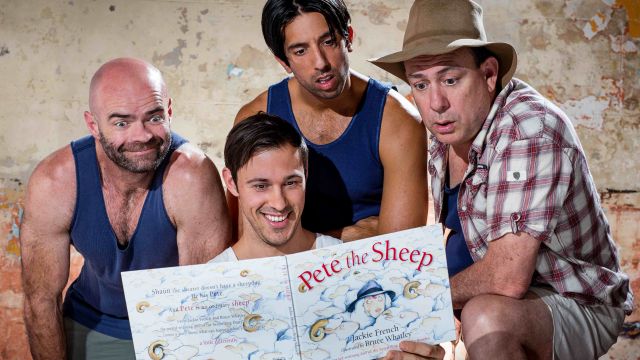Pete the Sheep: On Tour
Monkey Baa Theatre Company is touring a new 50-minute musical based on Jackie French and Bruce Whatley’s quintessentially Australian picture book to 54 venues this year.
It’s about Shaun, the sheep shearer, and Pete, a sheep, who set up their own shearing salon and are inundated with woolly clients. The composer/lyricist is Phil Scott, best known as pianist / performer in The Wharf Review. Neil Litchfield asked him about the challenge of writing songs for children.
“I weaned myself into thinking like a kid to some extent,” says Phil Scott. “I still do plays on words and try to be a bit funny, putting in one or two lines for the parents.
“The songs have to be short, punchy and fun, and there’s usually also room for at least one pinch hit number. There’s one in this, where Shaun the Shearer gets chucked out of the shearing shed and doesn’t know what to do, so he’s got a little sad song, but you can’t let that go on, because they lose interest.
“So you have to keep things like that in mind. The songs have to say who we are, and what we’re here for. But within that there’s scope for lots of stuff.
“The four actors in the show play shearers and sheepdogs and sheep, and they switch back and forth very quickly, so they get to sing as all those things. So the dogs have got a kind of a rhythm and blues or country blues sort of song which they can howl in.
“There are also scenes set in a hairdresser, because Shaun has a different idea of how he should do things, so instead of just shearing the sheep, he gives them fancy hairdos. For some reason I associate hairdressers with 60s Bossa Nova, so the there’s a clipping, cutting hair song that’s in that sort of style.”
How did Phil wean himself back into childhood?
“I thought back to what sort of songs I had really enjoyed as a little kid, and of course the songs from the Disney films were the ones. I had a look at them. Their lyrics are clever and their music is melodic, memorable and bright. So I guess I started from that.
“And The Wizard of Oz – I was a huge fan of that. Not that you could get it on VHS back then, I had to go to the Metro at Manly every six months or so. Kids like a bit of repetition in songs, like ‘Follow the Yellow Brick Road’, so they can sing some sort of simple musical phrase.
“Also, the first show I did at Monkey Baa I watched a few performances to see how the kids responded and which parts they liked best. They just loved the two rats in the show, who were the baddies, particularly the boys in the audience, so I gave them a vaudeville song and dance kind of number.”
 How does writing for children contrast with satirical song-writing for The Wharf Revue?
How does writing for children contrast with satirical song-writing for The Wharf Revue?
“In The Wharf Revue we mostly write parody lyrics to existing songs. Song parody is funnier than an original song because you know the song that is being parodied already, so you have an inbuilt humour quotient. And it’s easier.
“But with the Monkey Baa shows the music is all original; there’s stylistic pastiches but it’s all original, and I like to write original music.
How did work-shopping the piece impact on Phil’s songwriting?
“I think work-shopping has to be part of the process; you can’t just fling it on then find out that there are things that could have been done better in front of an audience.
“We cut verses out when we thought something was too long, and we talked about where we’d need some music to cover scene changes. It was very useful in terms of taking another step toward what the final product was going to be.
“It’s fun to get to know the cast. There’s one guy, Todd Keys, who has a very deep voice, so I wrote some harmonies. The best thing about writing four part harmonies for men is if you’ve got someone with a really strong bass voice to anchor it, so that’s in now.
“Monkey Baa is a fantastic company to work for; they’re so committed, and so detailed, and what they do, and what I also try to do, is they don’t talk down to their audiences. They don’t give the anything half formed or ‘Oh this will do’. They’re very precise in their scripts and everything.
“Also, the production values, within a limited budget. They’re very keen to give children a production which is up to the standards that you would put on for adults. I wouldn’t work for them otherwise.”
Click here for more tour details
Originally published in the March / April 2014 edition of Stage Whispers
Subscribe to our E-Newsletter, buy our latest print edition or find a Performing Arts book at Book Nook.

